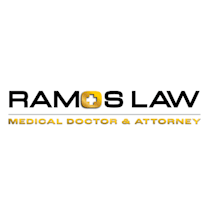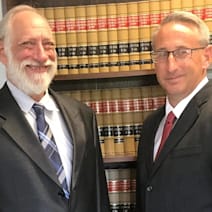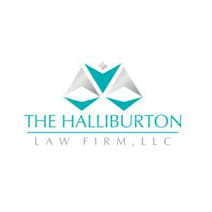Top Arvada, CO Personal Injury Lawyers Near You
4765 Independence Street, Suite: A, Wheat Ridge, CO 80033
Other Nearby Offices
Let the practice of Ramos Law in Arvada, Colorado be your Personal Injury advocate.
Se Habla Español
Free Consultation
Virtual Appointments
3773 Cherry Creek N Dr, Suite 710, Denver, CO 80209
Other Nearby Offices
Practical Personal Injury legal help. Representing Arvada, Colorado clients.
Free Consultation
1444 Blake Street, Denver, CO 80202
Other Nearby Offices
For legal issues concerning Personal Injury, let Tenge Law Firm, LLC, a local practice in Arvada, Colorado, help you find a solution.
Se Habla Español
Free Consultation
Virtual Appointments
730 17th St, Suite 850, Denver, CO 80202
Assisting people in Colorado with their Personal Injury needs. Learn More.
Free Consultation
7375 East Orchard Road, Suite 300, Greenwood Village, CO 80111
The Gold Law Firm, a reputable Personal Injury firm in Colorado, serves the Arvada area.
Free Consultation
12567 W. Cedar Dr, Suite 120, Lakewood, CO 80228
Other Nearby Offices
Franklin D. Azar & Associates, P.C. has experience helping clients with their Personal Injury needs in Arvada, Colorado.
Se Habla Español
Free Consultation
363 South Harlan Street, Suite 205, Lakewood, CO 80226
In Arvada, Colorado area, Silvern & Bulger, P.C. can help clients with their Personal Injury needs.
Free Consultation
1800 Glenarm Place, Unit 101, Denver, CO 80202
The Halliburton Law Firm, LLC is experienced handling Personal Injury cases in the Arvada area.
Free Consultation
950 South Cherry Street, Suite 300, Denver, CO 80246
The Viorst Law Offices, P.C., a local Personal Injury firm with years of experience helping clients in the Arvada, Colorado area.
Se Habla Español
Free Consultation
1899 Wynkoop St, Suite 750, Denver, CO 80202
4725 S Monaco St, Suite 120, Denver, CO 80237
600 17th Street, Unit 2823, Denver, CO 80202
1801 California Street, Suite 4400, Denver, CO 80202
1331 17th Street, Suite 520, Denver, CO 80202
7375 E Orchard Rd, Suite 300, Englewood, CO 80111
600 17th Street, Suite 2625S, Denver, CO 80202
1900 Sixteenth Street, Suite 800, Denver, CO 80202
1330 Logan Street, Suite B2, Denver, CO 80203
1731 Gilpin Street, Denver, CO 80218
8310 South Valley Highway, Suite 300, Englewood, CO 80112
1801 California St, Suite 2700, Denver, CO 80202
44 Cook Street, Suite 100, Denver, CO 80206
6465 Greenwood Plaza Blvd, Suite 180, Greenwood Village, CO 80111
1624 Market St., Ste. 202, Denver, CO 80202
1144 15th St, Suite 3400, Denver, CO 80202
Arvada Personal Injury Information
Lead Counsel independently verifies Personal Injury attorneys in Arvada and checks their standing with Colorado bar associations.
Our Verification Process and Criteria
Ample Experience
Attorneys must meet stringent qualifications and prove they practice in the area of law they’re verified in.Good Standing
Be in good standing with their bar associations and maintain a clean disciplinary record.Annual Review
Submit to an annual review to retain their Lead Counsel Verified status.Client Commitment
Pledge to follow the highest quality client service and ethical standards.
What Is Personal Injury?
Personal injury is the legal term for harm or damage to someone’s mind or body, due to negligence, recklessness, or intentional actions. Personal injury cases allow people who have suffered harm or losses to get compensation for someone else’s wrongful conduct. These cases usually seek compensation for medical expenses, lost wages, pain and suffering, emotional distress, and other losses. Common types of personal injury cases include:
- Car, train, and boat accidents
- Police misconduct
- Food poisoning
- Libel and slander
- Fraud
- Invasion of privacy and trespassing
- Battery
- Spinal cord and sports injuries
How Can a Personal Injury Lawyer Help Me?
An experienced lawyer can give you the knowledge and backing you need to navigate the legal system and find the best possible results for your case. Because laws are different from state to state, speaking with a lawyer near you is critical in understanding all the elements of your situation and making the best decisions to move forward. A personal injury lawyer can help with:
- Legal counsel and guidance
- Investigating and gathering evidence
- Determining liability
- Evaluating damages
- Negotiating with insurance companies
- Litigation and trial representation
What Are the Top Questions When Choosing a Personal Injury Lawyer?
These questions can help you decide if you feel comfortable and confident that a lawyer has the qualifications, experience, and ability to manage your case well. Many lawyers offer free consultations that allow you to understand your options and get specific legal advice before hiring them. Top questions include:
- What experience do you have in handling personal injury cases?
- Have you previously represented clients with similar types of accidents or injuries to mine?
- What is your success rate in obtaining favorable settlements or verdicts for your clients in personal injury cases? How will you assess the strength of my case and determine its value? Do you have a network of experts, such as accident reconstruction specialists or medical professionals, who can support my case if needed? What is your approach to negotiating with insurance companies?
Tips for Hiring a Lawyer
Taking the time to find a lawyer who is right for you and will represent your best interests is an important first step in protecting your rights. Find a lawyer who understands your case, knows your needs and goals, and has the experience to get the best outcome. Things to do:
- Ask for recommendations
- Research lawyers online
- Schedule consultations
- Review experience and expertise
- Talk about fees and billing
- Trust your instincts









